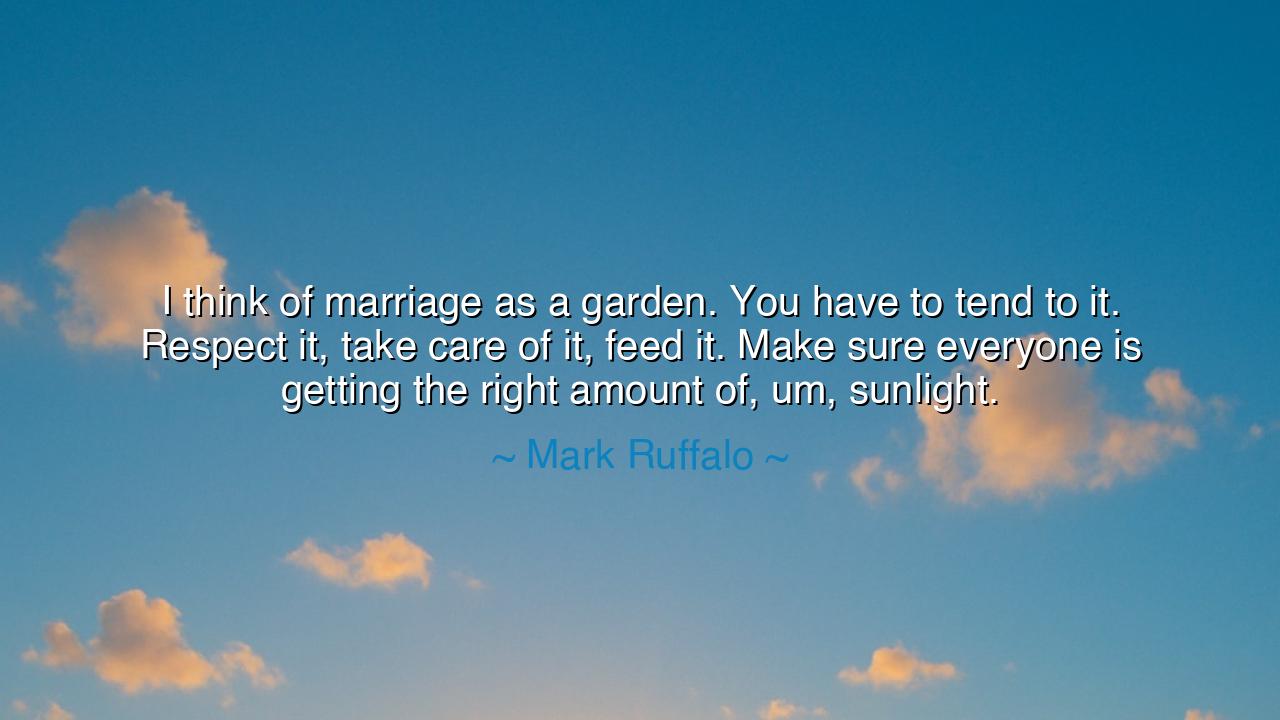
I think of marriage as a garden. You have to tend to it. Respect
I think of marriage as a garden. You have to tend to it. Respect it, take care of it, feed it. Make sure everyone is getting the right amount of, um, sunlight.






The words of Mark Ruffalo, “I think of marriage as a garden. You have to tend to it. Respect it, take care of it, feed it. Make sure everyone is getting the right amount of, um, sunlight,” reveal a tender and timeless wisdom: that love is not a fixed thing, but a living creation — something that grows only when cared for. In his metaphor, Ruffalo reminds us that marriage, like a garden, is both beautiful and fragile. It flourishes through patience, attention, and effort, but withers in neglect. His imagery captures what poets, philosophers, and lovers have known since ancient times — that love is not sustained by passion alone, but by daily devotion, by the humble acts of care that nourish the heart as water nourishes the soil.
To see marriage as a garden is to understand that it is a work of cultivation. In the beginning, the ground may be rich with the excitement of new love — fertile and full of promise. Yet even the richest soil grows barren if it is not tended. Weeds of misunderstanding, pride, and resentment will rise quickly if left unchecked. The ancient sages spoke often of this truth: that relationships, like fields, require constant attention. The philosopher Confucius once said that harmony between people must be “cultivated daily, like one tends the root of a tree.” Ruffalo’s metaphor echoes that same insight — that love, to endure, must be treated as a living organism, not a possession.
His mention of respect and care speaks to the moral foundation of love. To “feed” a marriage is to feed the soul of one’s partner — through kindness, understanding, and gratitude. The ancients called this mutual reverence, the sense that each partner honors the divine spark within the other. In Greek thought, love (agape) was seen not merely as passion but as an act of service — the willful choice to nurture another’s well-being. When Ruffalo says, “make sure everyone is getting the right amount of sunlight,” he points to one of the deepest truths of partnership: that balance is essential. No one should be overshadowed; both must have space to grow. Love is not the merging of two souls into one shadow, but the intertwining of two trees whose roots share the same earth but whose branches reach freely toward the light.
We can find this truth beautifully reflected in history. Consider the marriage of John and Abigail Adams, whose love endured through decades of separation during the American Revolution. Their letters reveal two people who tended to their relationship like gardeners, watering it with words of encouragement, trimming away fear with humor, and fertilizing it with shared ideals. Though distance tested them, their devotion deepened. They understood, as Ruffalo suggests, that love is not a feeling that endures by itself — it is a daily act of tending, a choice renewed with every sunrise.
Yet, even the most diligent gardener faces seasons of struggle. There will be winters in every marriage — times of cold silence or hardship when nothing seems to grow. But the wise do not despair; they remember that beneath the frost, the roots are still alive. In such seasons, faithfulness becomes the gardener’s warmth. To stay, to wait, to continue to nurture even when the flowers have faded — this is the essence of enduring love. Ruffalo’s simple imagery conceals profound spiritual insight: that love’s strength is revealed not in its harvest, but in its perseverance through barrenness.
His words also remind us of humility. For a gardener cannot control the weather — only prepare the soil. Likewise, in marriage, we cannot command affection, but we can create the conditions where it may flourish. To “feed” and “care” is to do the small, consistent things — to listen without judgment, to speak with gentleness, to forgive often, and to celebrate the smallest blossoms of joy. The ancient Stoics taught that peace comes not from controlling fate, but from tending to one’s duty with sincerity. So too in love: our task is not to demand perfection from our partner, but to serve with patience and gratitude, trusting that the divine rhythm of growth will unfold in time.
Let this be the lesson for all who hear Mark Ruffalo’s words: love is not a gift to be kept, but a garden to be tended. Do not neglect it for a single day. Pull the weeds of resentment before they take root. Pour water upon the soil with words of kindness. Offer warmth and sunlight — not by force, but by gentle presence. And when storms come, as they always will, stand together like steadfast oaks, remembering that every great garden has known both drought and rain.
Thus, Ruffalo’s reflection becomes more than a metaphor; it is a philosophy of devotion. He reminds us that the beauty of marriage does not lie in its ease, but in its care — in the humble, daily work of two souls who choose to grow together. For the garden of love, once truly cultivated, does not wither with time; it becomes a living testament to patience, resilience, and the sacred art of tending the heart.






AAdministratorAdministrator
Welcome, honored guests. Please leave a comment, we will respond soon